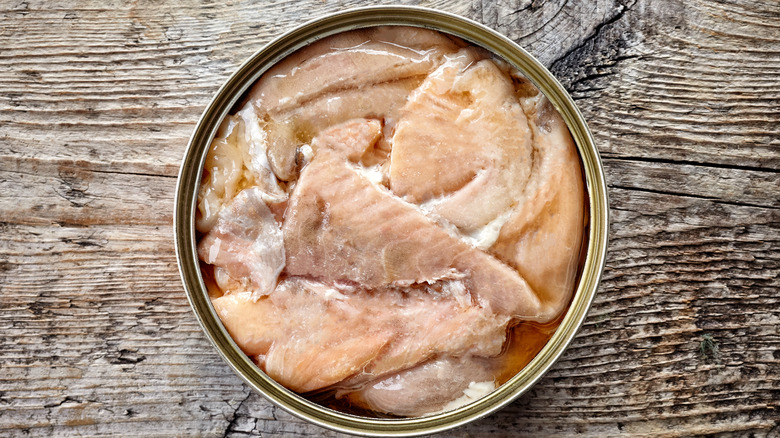Is It Safe To Freeze Canned Salmon?
We may receive a commission on purchases made from links.
Though it may look a bit unappetizing, canned fish is an absolute staple. From tuna salad sandwiches to salmon croquettes, the possibilities are both infinite and protein-packed. Plus, if it's stored in a dark and cool spot, canned fish can last for up to five years on your shelf. Canned salmon is one of our favorites, and while you could eat it straight from the can, we like to elevate canned salmon via a variety of different recipes, whether it be salmon burgers or a salmon casserole. If you decide to cook with canned salmon and have some leftovers, you should know that you can freeze them, as long as you follow a few guidelines to ensure proper food safety.
The most important thing to remember when it comes to freezing canned salmon is to remove it from its can. When you're ready to freeze it, transfer it from its can to an airtight, freezer-safe container, like this one from Amazon. If you think you'll eat it in the next three or four days, simply date it and throw it into the fridge. However, if you don't think you'll consume it soon, freezing it is your best bet. In the freezer, it will last for up to three months.
When you're ready to cook with it again, remove it from the freezer to thaw it. The best way to thaw frozen salmon is by moving its container to the refrigerator, where it should thaw overnight for a minimum of 12 hours. Depending on the quantity, this might take a bit more time, so think ahead when you're planning out your meals.
Signs your salmon has gone bad
Freezing cooked, canned salmon is a great way to get the most out of the kitchen staple. And while it's supposed to last up to three months in the freezer, you should still be able to recognize the signs of salmon that's gone bad so that you can avoid getting ill. Once your salmon has been thawed, you'll be able to get a better sense as to whether or not it's spoiled. The easiest way to tell whether your salmon is bad is by using the smell test, but sometimes, smell is not the best way to judge the safety of leftovers. If your salmon is bad, it will smell overwhelmingly fishy, which is a telltale sign it should be thrown out. But there are other visual signs you can look for when examining your thawed-out salmon.
If your salmon has any sort of mold or abnormal sliminess, it's definitely time to get rid of it. Additionally, if it has a dull or grayish tint to it that's more universal than the totally normal fatty gray pieces, it's recommended not to eat it. Overall, if you're familiar with salmon, you probably know what it should and shouldn't look or smell like, so trust your judgment. That way, you can have a worry-free meal with your leftover canned salmon.

